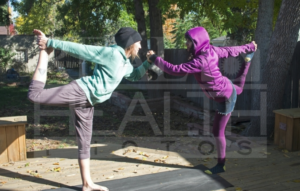¡Caminemos Juntas!: A Smartphone App for Latinas to Connect with Walking Partners
Dr. Valerie Myers, Klein Buendel (KB) Senior Scientist, is the Principal Investigator leading a new research project aimed at helping Latinas combat barriers to physical activity using smartphone technology and social networks.
Hispanic women are a growing and influential segment of the population, yet health disparities for Latinas remain high. Latinas are more likely than their non-Hispanic White counterparts to be overweight, diagnosed with diabetes, and physically inactive. Regular physical activity promotes physical and emotional well-being, such as lower risk of heart disease and diabetes, weight management, and improved quality of life, yet physical activity interventions for Latinas remain limited.
Community-focused walking interventions produce improvements in physical activity and are well-received by Latinas when they are socioculturally sensitive. New technology has the ability to provide Latinas with innovative ways to connect socially and increase PA. Location-based services (LBS) are a popular technology that uses geographical positioning to allow individuals to use their smartphones to connect to their surrounding environment.
¡Caminemos Juntas! is a physical activity walking app that uses location-based services to connect Latinas within nearby neighborhoods as a way to provide social support for increased walking behavior. A prototype of the ¡Caminemos Juntas! app was programmed for both iOS and Android smartphones in a previous Phase I project. Multi-method formative research was conducted to guide app design and content prior to conducting field usability testing. To guide prototype development, a national sample of Latinas (n=98; mean age 32.7 +/- 7.8 years; 45% primary Spanish speaking; 28.6% with annual income < $15,000) were surveyed to better understand their preferences, usage, needs, and obstacles of current apps in relation to health and physical activity. Latinas’ current physical activity behaviors and smartphone use, opinions on health-related apps using LBS, how often they access social networking sites on their mobile phone, and their likelihood of using a social networking app to connect to others with intentions to be physically active were also examined.
Phase I results revealed that 22.5% never or rarely exercised, 73.5% accessed social networking sites daily with an average of 8 times a day, and 43.9% used LBS every day. Ease of use (82%), informationally accurate (79.2%), and reliability (84.7%) were app features rated as highly important. Over 63% reported high likelihood of using a social networking app to connect to others with the intentions of being physically active, and 67.4% reported that this type of app would be very helpful. Focus groups showed that the app was appealing, also.
In the new Phase II project, the ¡Caminemos Juntas! app will be fully developed and evaluated in a randomized control trial with Latinas aged 18-45 in San Jose, CA and Denver, CO. Changes in physical activity, social support for exercise, and quality of life will be evaluated. New features to be explored include Fitbit® device integration, mapping of walks, and social media integration. The LBS features of the app will allow Latinas to determine a safe place to meet for a walk, connect with other users nearby, and be notified if there was an available walk in the user’s vicinity.
The research is funded by the National Institute on Minority Health and Health Disparities (MD009652) at the National Institutes of Health through the Small Business Innovation Research Program. Dr. Myers’ collaborators include Dr. Abby King from Stanford University, and Dr. Gary Cutter from Pythagorus, Inc. in Alabama.








 Robert Saltz, Ph.D. is a Senior Research Scientist at the Pacific Institute for Research and Evaluation (PIRE) in Berkeley, California.
Robert Saltz, Ph.D. is a Senior Research Scientist at the Pacific Institute for Research and Evaluation (PIRE) in Berkeley, California.
 Dr. Victoria Sánchez is an Associate Professor in the
Dr. Victoria Sánchez is an Associate Professor in the